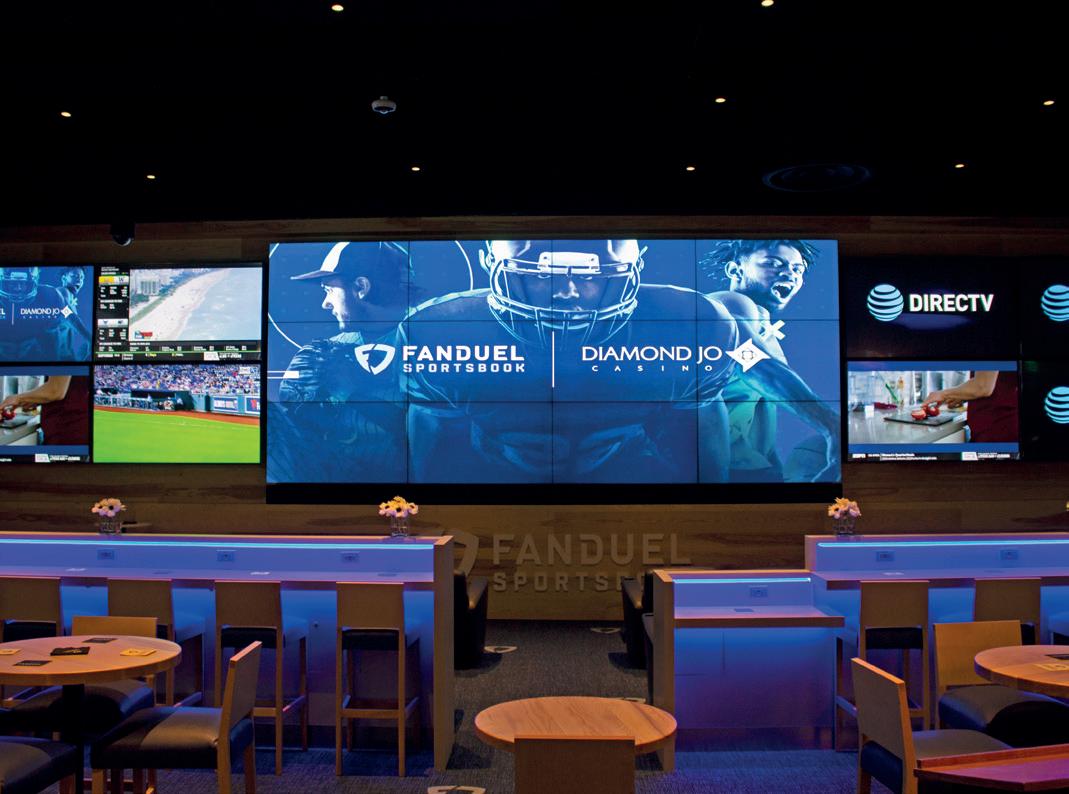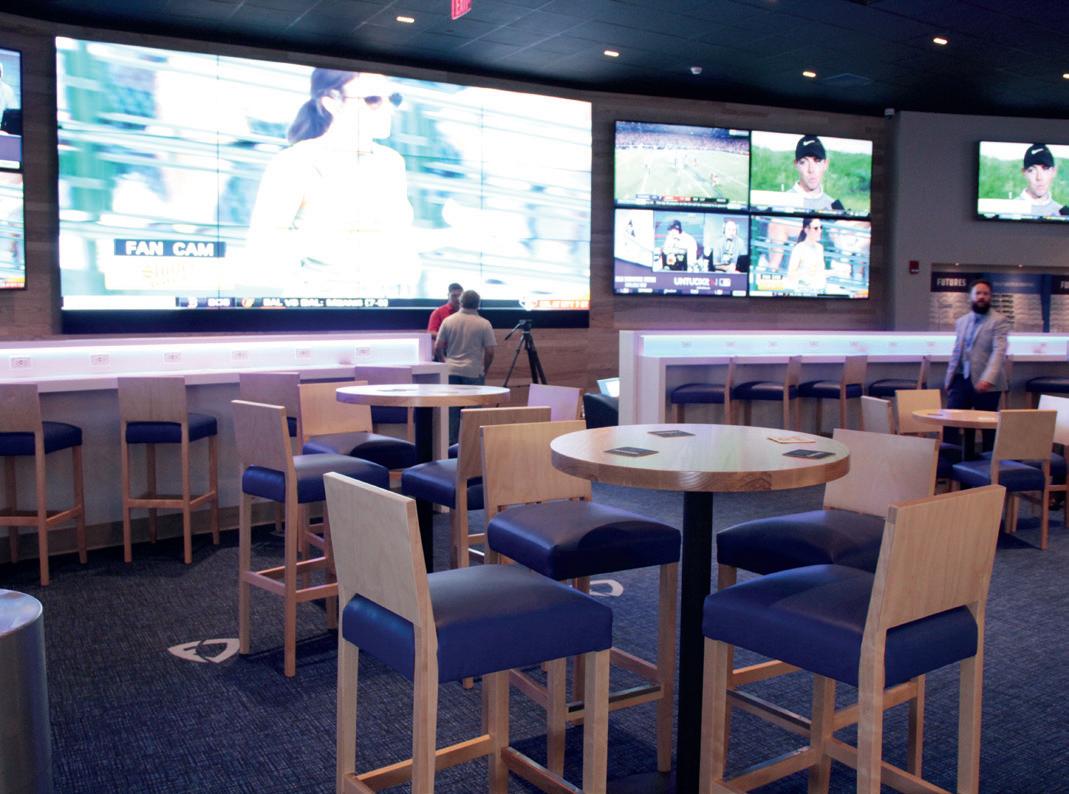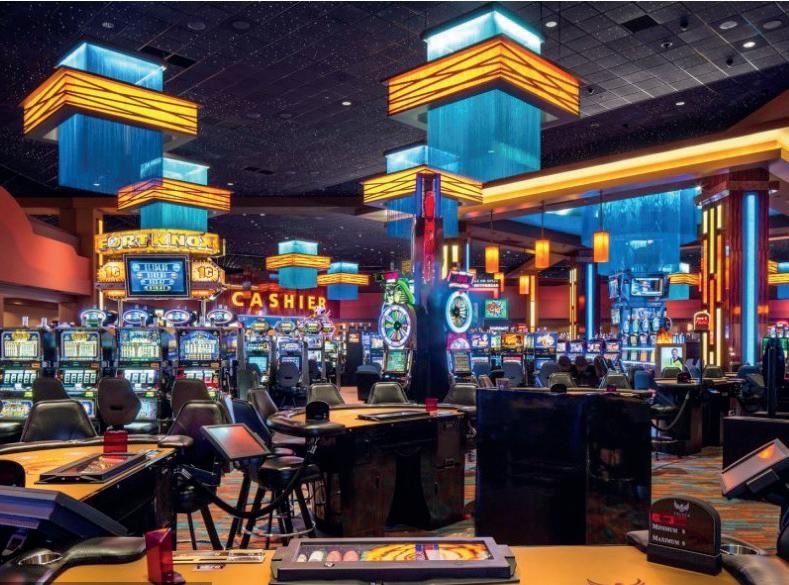
15 minute read
Same Game, Different Arena Internet play saved sports betting during the Great Shutdown by David McKee
SAME GAME, DIFFERENT ARENA
Internet play saved sports betting during the Great Shutdown by David McKee
ports bettors gotta
Sbet. Yes, even during a pandemic. The latter was one of the best things that could have happened for online sports betting, as quarantined punters placed wagers from the comfort of home. Nor has the pace slowed in the U.S. as casinos have opened, especially with four major leagues—the National Football League, National Basketball Association, Major League Baseball and National Hockey League—all in play simultaneously, thanks to a hiatus in the seasons of all but the NFL (which did skip pre-season games in a concession to Covid-19).
“It came right as March Madness was going on. We were doing conference tournaments that were getting cancelled minute by minute, hour by hour,” Jessica Welman, PlayUSA.com analyst said of the cascade of closures. But, as time wore on, she and her colleagues found that, cooped up at home, people wanted some form of sporting entertainment.
Even in April, with college basketball, the NBA, MLB and NHL all down for the count, sports betting managed to eke out $140 million (down from March’s $607.5 million). Sports book operators managed, through a mix of desperation and creativity, to create betting excitement around sports as
exotic (and esoteric) as Belarussian soccer and Japanese baseball. Says Welman, “what we found was states like Colorado that launched sports betting when there was nothing to bet on, essentially, took to some weird stuff. For example, table tennis. Betting on European table tennis contests became this surprising windfall for the operators.”
Action began trending back upward: $344 million in May, $447.5 million in June. This coincided with the Great Shutdown of the American casino industry, which meant that the betting was entirely driven by online applications (during normal times it averages 80 percent, according to Fantini Research CEO Frank Fantini).
“Mobile and in-game play are very attractive and are not competing with casinos for gambling dollars. They are markets in themselves, so as more jurisdictions open, they continue to grow regardless of whether there are brick-and-mortar casinos,” Fantini elaborates.
“It was an opportunity,” says Jason Scott, vice president of trading for BetMGM. “It came at the right time for us to manage our product and the customers. It opened their eyes to different sports. Soccer and table tennis were the two where a substantial amount of product were offered throughout Covid and that people bet on. It gave people an awareness that the online casino was still around and it just conditioned people to bet on more and different sports than just what’s on the TV every night.”
A new normal?
The conventional sports book may never completely come back. Welman cites states like New Jersey and Pennsylvania where online betting was trending toward 85 percent to 90 percent of the market. What’s more, in Colorado casino gambling (and thus terrestrial sports books) are confined to three small towns. “It’s not like Las Vegas. It’s not like I can drive five minutes and be at a casino and bet at a sports book,” continues Welman. “A state like Indiana, most casinos are located on the perimeter of that state, so if you live in Indianapolis there’s not really a casino near you.”
Reports MGM’s Scott, “The books are coming back but not to the extent of what they were. The simple fact of the matter is not many people want to travel now. There’s no international travel and not a hell of a lot of domestic travel. What we’ll see longterm is that there will be a migration to digital. When people realize they don’t have to leave their house, get dressed and drive to the casino to have a bet, they can do it online it means they’re more likely to place bets and at different time. So eventually, inevitably, digital will start to erode retail.”
Fantini, however, sees a terrestrial upside. “All of the regional casino companies are reporting that sports betting is complementary and is drawing new players to their casinos. And they can market their resorts and amenities as rewards to online players further strengthening their land-based businesses.” For instance, Welman reports “one odd exception” just outside Cincinnati, Penn National Gaming’s Hollywood Casino Lawrenceburg, where retail handle outdoes its online counterpart, PointsBet. “It outperforms a lot of the apps, actually, and that’s just one of those weird pockets where that’s a working-class, industrial kind of town. There’s a certain amount of distrust with doing things on the Internet or on the phone, or it might just be an older segment of the population that is more comfortable going across state lines to bet at the casino and watch games.”
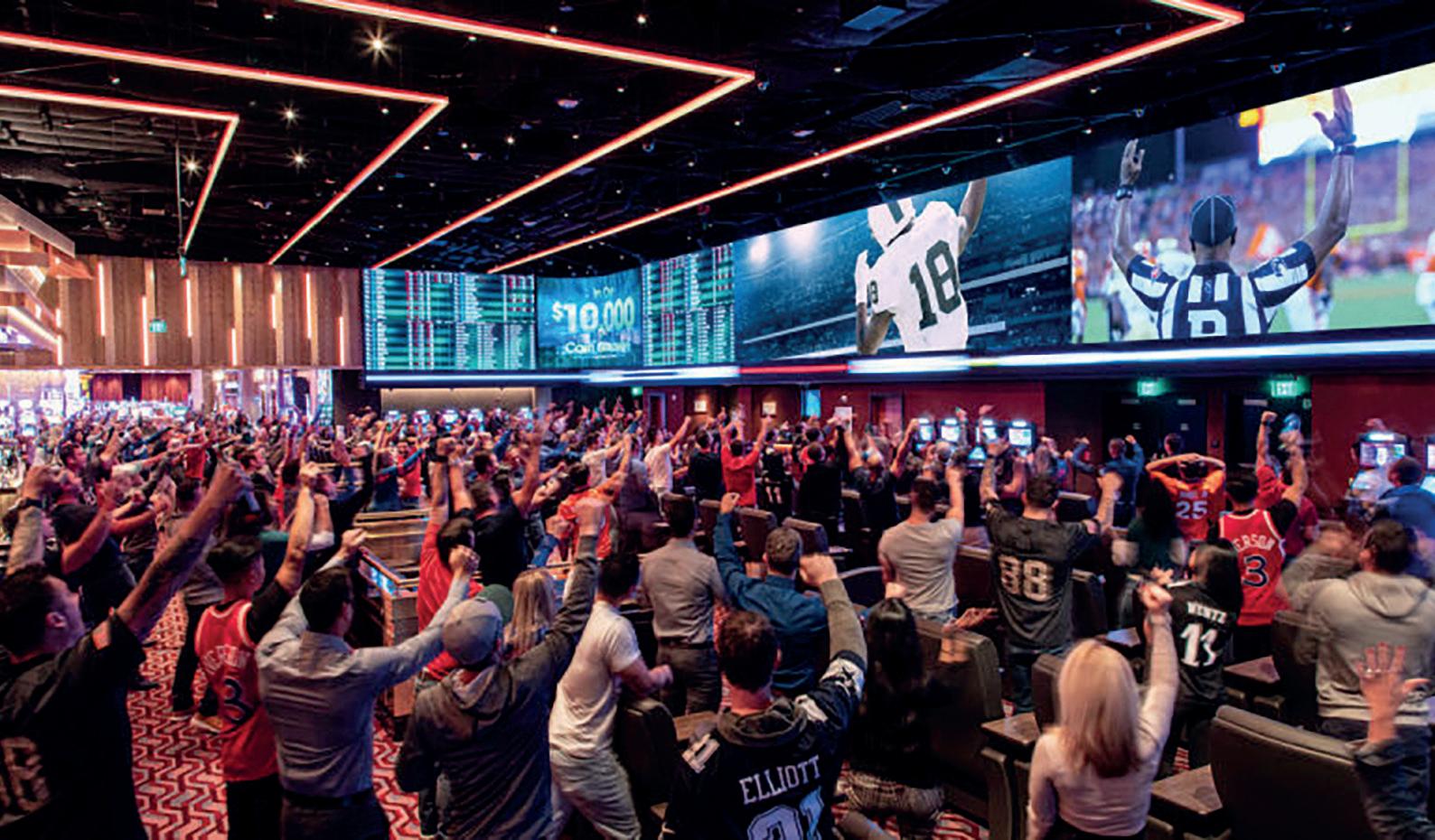
Land speed record
And, as they watch, sports betting has revved up to a record pace. Majorleague sports began ramping back up in July ($902 million) and—allowing for Covid-19 “bubbles”—were going in earnest by August, when punters put down $2.2 billion, accelerating to $2.5 billion in September, which enjoyed the anomaly of delayed NBA and NHL playoffs, MLB’s stretch drive and the kickoff of NFL season. Huge handle, however, does not translate into enormous profits, for a variety of reasons. Welman explains that “you hear these numbers, these zillions. It’s a low-margin industry. We’ve seen hold, which is just the amount of bets placed, the amount of bets paid out, what’s the difference? That amount is a little over 7 percent in some of these newer markets. In Nevada it’s traditionally been like 10 percent. The books are only making 6 percent but then you have to factor in that these new sports books, the FanDuels, the DraftKings, they’re paying for immense ad buys and they’re throwing huge amounts of money at people in the form of promo dollars.”
For instance, Barstool Sports’ muchballyhooed debut in Pennsylvania saw the company lose $3 million at the wickets. This is credited (or blamed) on heavy promotional spending, which at least has the virtue of being tax-deductible … a good thing, too, in Pennsylvania, where sports-betting revenue is taxed at a confiscatory 36 percent. “In Colorado, the sports books there have given out more money collectively in promo credit than they’ve made by a couple of million dollars,” adds Welman. “Some of this is like slightly creative accounting.”
So did September represent the new normal in sports betting or was it a high-water mark (until more states come on line)? Scott believes the torrid pace can be maintained “because there’s some cannibalism when the four leagues are in play. We saw when football started that turnover in interest in the NBA and MLB dropped. Football’s obviously always going to be king in this country, and when the MLB ran into the NBA it dropped, so there’s a hierarchy.
People are going to follow their money and most people have only got one television to watch them on. So, in a way, four leagues running concurrently was disadvantageous to us, compared to having them spread out during the year.”
Welman is more cautious. “New Jersey had $750 million wagered. I don’t think you’re going to scratch that record for a while because September was just this bizarre anomaly of NBA finals, Stanley Cup playoffs, the MLB reaching an important part of its season and starting its postseason, and the return of NFL football. That is a super-mega sports month and it’s just not gonna exist again. So the numbers you would see are anomalous and they’re going to stand as the record for the next several months, at least.”
Fighting the Goliaths
In any discussion of sports betting, the two 800-pound gorillas in the room are DraftKings and FanDuel, which built a constituency over several years through daily fantasy sports and, once the Bradley Act was struck down by the U.S. Supreme Court, pivoted immediately to conventional sports betting. As Fantini puts it, “The companies that have the biggest databases of players have two big advantages: They start with a large numbers of players they can market to which means player acquisition costs can be much lower. They don’t have to spend 30 or 40 percent of revenue attracting players.” They command so much market share that the Federal Trade Commission forbade them from merging, lest it create a monopoly. How does a relative newbie like BetMGM (born in 2018) compete?
Scott says the DraftKings/FanDuel advantage is “they can go into a new state and they’ve already got millions if not tens of millions of customers from their [DFS]. So they’re have these customers, they already have their credit-card details, they’ve already got their Know Your Customer regime, so they’re ready to bet.” He adds, “That’s not to say we can’t catch them. It’s a game that’s going to be won digitally. It’s going to be won by the company or operator that offers the best experience. That’s an experience with an app that’s easy to use and clean, with markets that are easy to locate, to markets that are interesting, good competitive pricing and outstanding customer service. It’s the complete package that will win this game in the long run.”
BetMGM has a fan in Welman, who says, “What will be more interesting to me than Barstool will be a company like MGM. MGM had sports betting as a product in Nevada. It wasn’t supergreat. Only this football season has MGM come out full force with apps and launches and promos, and that is a company—given the people in the MGM data base—given the recognition of the MGM casino brand, that’s one that I could see potentially eating into the market share of FanDuel and DraftKings.”
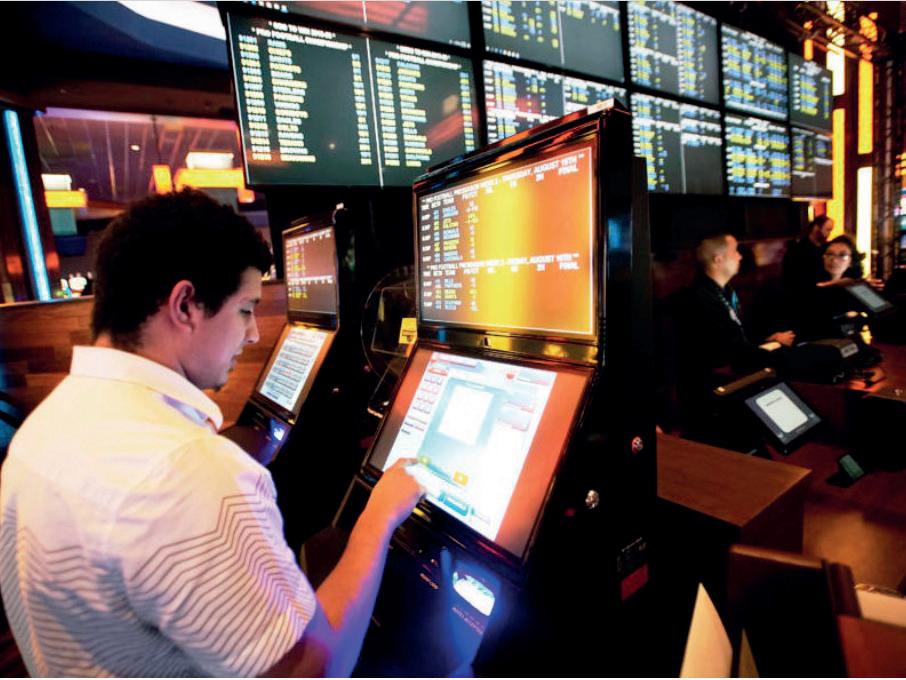
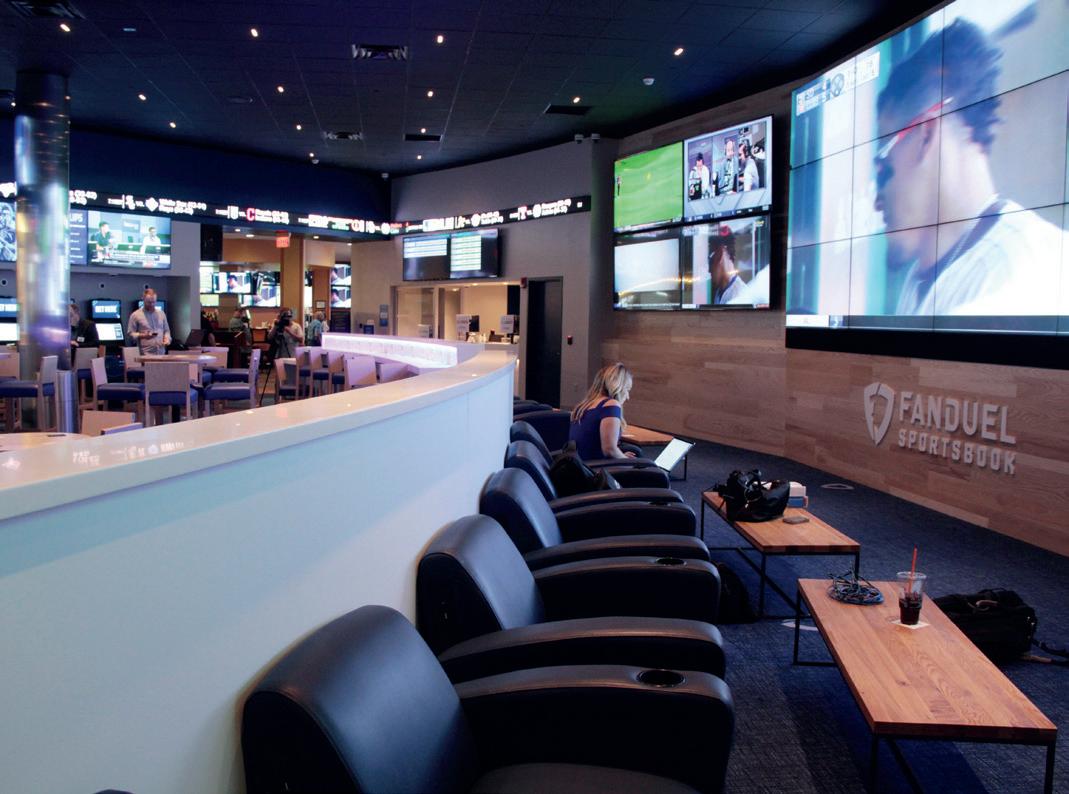
That being said, there are some niche operators who are showing promise. BetRivers, for one. It’s strong in Pennsylvania and utterly dominant in Illinois. It doesn’t hurt that it’s twinned with the most successful casino (by far) in the Chicago area, so it has brand recognition going for it. There are one or two others who could emulate its success story on a regional scale. And there are momand-pop operators in some of the nascent markets. “The question is, are they going to be smaller, regional groups like a BetRivers or we’re seeing in the Washington, D.C., area and Tennessee that there are some homegrown books trying to take on the big players and those are the ones I worry the most,” says Welman, fretting “about just not having the financial firepower to compete with the deals that the big two are offering.
Fantini is a believer in Barstool. “Penn National will be a big player with the 60 million-plus users of Barstool Sports combined with Penn’s own huge database of players from regional markets throughout the country. Caesars has gaming’s biggest player database and the expertise, network and database of William Hill US.” It’s got a strategic advantage that Fantini highlights. “It’s also a battle for eyeballs. That is why operators have been signing deals with big media companies. Caesars and William Hill, for example, have deals with ESPN and CBS. That’s millions of viewers exposed to their advertising and their special deals aired smack in the middle of the football or basketball games fans are watching.
“Additionally, the databases of brick-and-mortar casino operators like Penn, Caesars and MGM Resorts are more than millions of names. They are actually player loyalty programs that create customer stickiness, and their resorts are powerful marketing tools and customer rewards assets.”
Irrational exuberance?
Given the recent run-up in sports betting itself, are stocks being overvalued? “Yes. Sports betting is a $1.4 billion a year revenue business,” says Fantini. “Many projections are for it to grow to $13 billion or $14 billion in several years after most states legalize it. However, there are estimates of $20 billion, $25 billion. I’ve seen as high as $33 billion [in revenue]. Valuations are high in anticipation of sports betting’s positive impact on the companies. Perhaps the most stretched valuation is DraftKings trading at maybe 20 times projected EBITDA six and seven years out. Penn National also is high, but it has its big brick-and-mortar casino business to provide ballast.
“To give you an idea of how unrealistic some of those forecasts might be, Deutsche Bank gaming analyst Carlo Santarelli calculates that achieving $20 billion in revenues would require every adult American to bet and to do so at 65 percent higher than New Jersey’s per capita of $51,” fifty-one bucks that Fantini thinks is a reliable metric. “At any rate, investors
Reach into Europe’s Biggest New Business Market with App, Digital and in Print
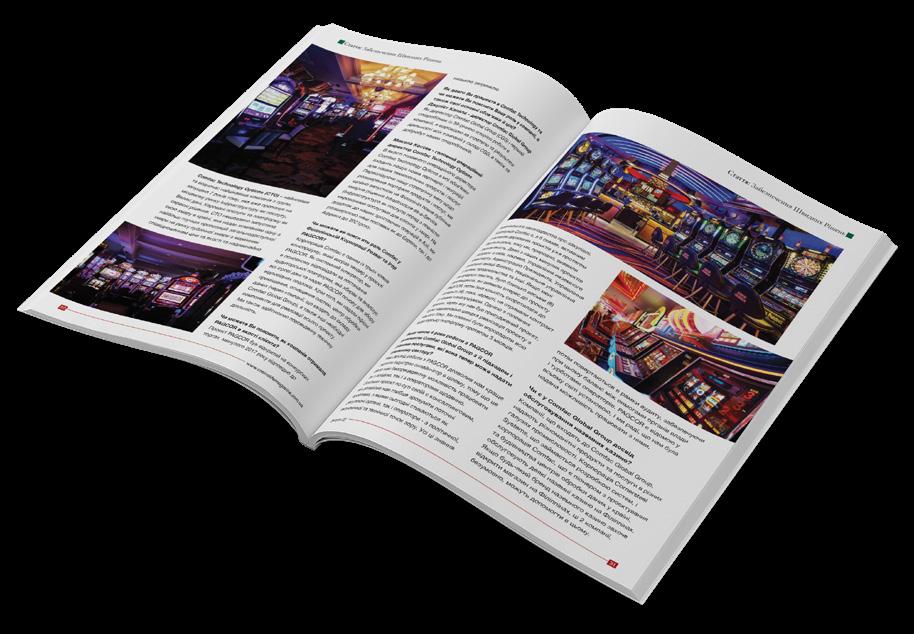

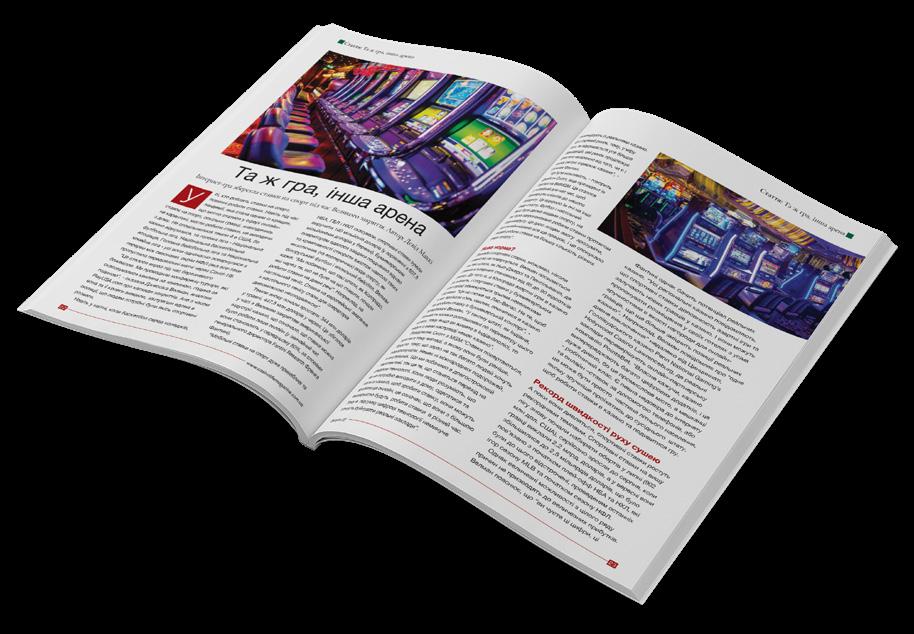

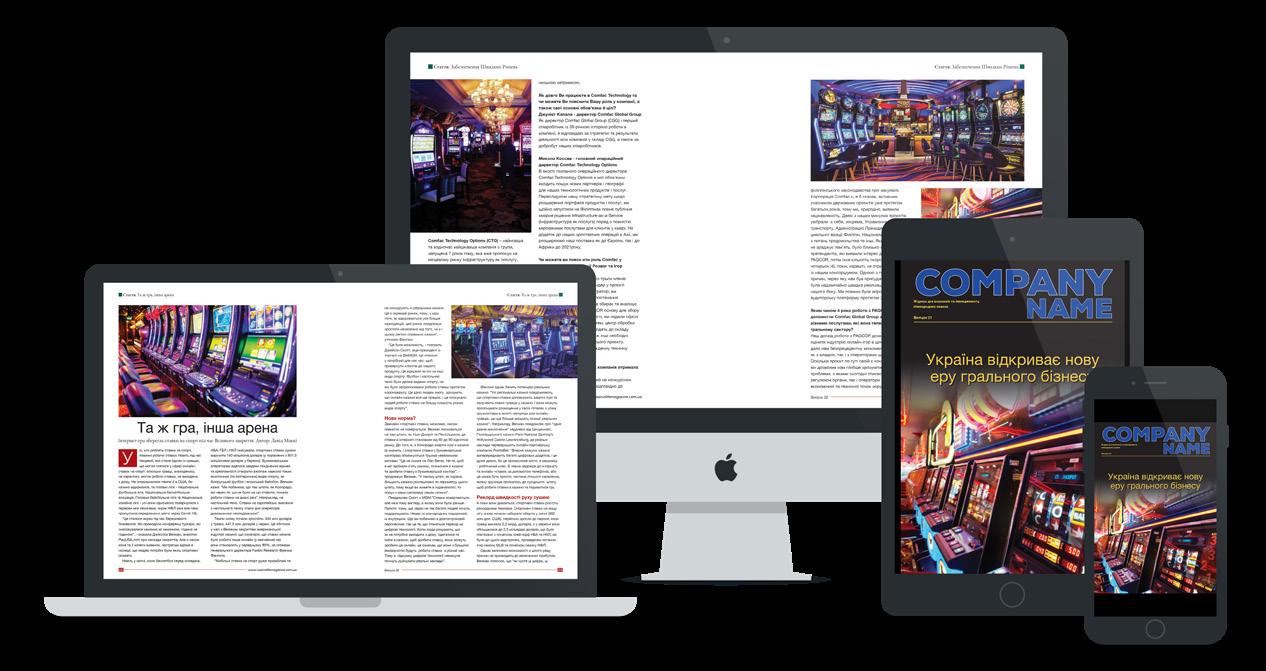
• Bespoke Designed Ukraine Language Media • Custom Designed Ukrainian Language Sales Literature
Contact newbusiness@outsourcedigitalmedia.com or call +44 (0) 1892 740869
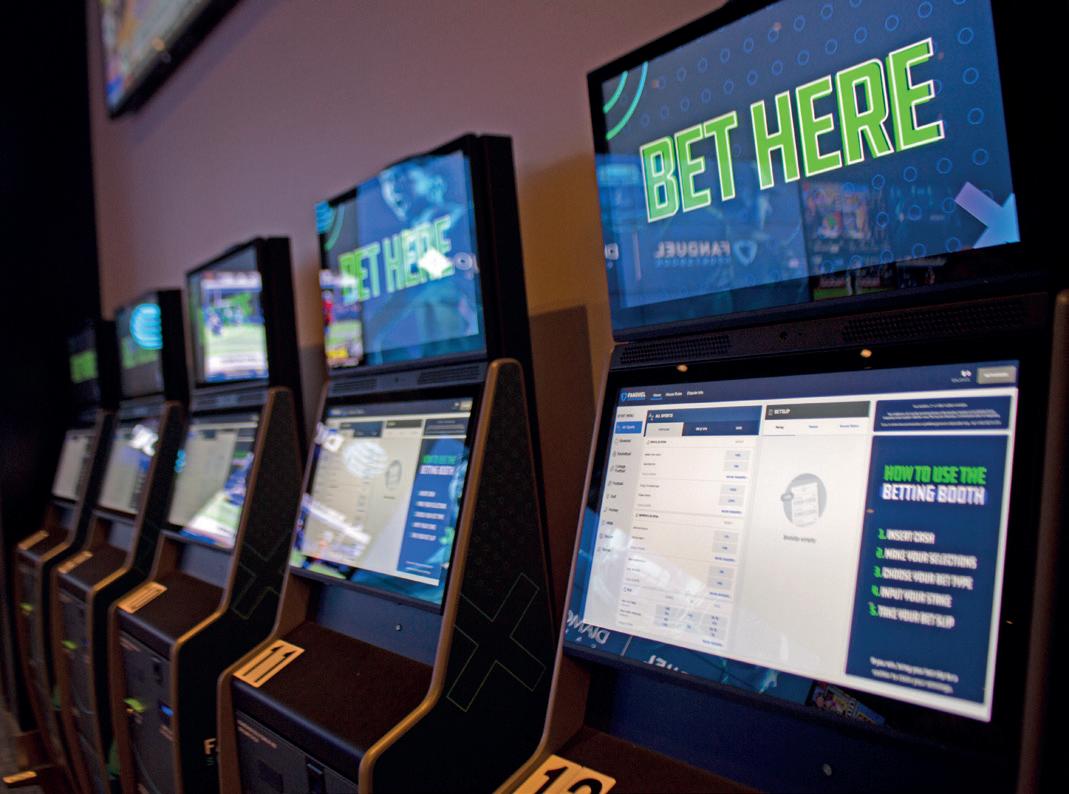
paying high prices for stocks based on assumptions of $25 billion or $30 billion revenues are going to be disappointed, especially if they pick losers or pay up for stocks in which sports betting cannot reasonably boost prices sufficiently by itself.”
In the meantime, what about those boutique sports that thrived during the Great Shutdown? Were they a blip or are they here to stay? “It was an anomaly,” opines Scott. “The e-sports, the table tennis, there might be slightly higher levels than there were prior to Covid but they’re still … the big business is obviously the American sports. We’re seeing more and more business on tennis and soccer. Once tennis comes back and the players are comfortable flying, particularly the ladies—there’s not too many of the big names playing at the moment, the big players only come out for Wimbledon, the U.S. Open, the French Open. We’ll get a bit more activity there but the game is always going to be dominated by the big American sports.” That being said, “tennis is on 365 days of the year. People start to realize that there’s a lot of micro-markets in tennis: betting next point, next game, next set. Around the world we’ve found they’re really popular to bet on.”
Welman’s research leads her to essentially agree, saying “from what we’ve seen it is an anomaly but Colorado is one of the states that publishes betting by sport and table tennis has remained in the top 10 of sports being wagered on. There are people who, once they’ve put in the effort to learn the sport and realize it’s kind of fun, we’ll probably see some converted bettors out of that who continue to make table tennis more popular than anyone ever expected. [But] I don’t think you’re going to have some serious South Korean baseball betting now that the MLB is back.”
We asked all our experts to look into their crystal balls to see where sports betting would be in five years. Scott was blunt in his assessment. “There will be some consolidation. The big companies will survive. We’ll see some partnerships with media companies. There’ll be three to four operators, probably running 90 to 95 percent of the market.”
Welman perceived a potential cloud on the horizon. “It’s a good thing that people realize sports betting is something that can be done legally for fun but you always have to ask the problem-gambling question of ‘Are we making it too in-your-face and creating a potential problem for ourselves?’ That might play out in the next few years, as we’re seeing it in Europe,” she said.” Intervention is coming to limit just how much of their airtime is dominated by sports betting.” Perhaps mindful of this, some of the major operators are being more discreet in their ad buys than they were two years ago.
Like Scott, Fantini sees consolidation on the way, predicting that DraftKings, FanDuel, Barstool
and William Hill/Caesars could end up with as much as 90 percent of the American market between them. “That will leave smaller operators fighting it out for market share and having to pay heavily for customer acquisition. Finally, there are a couple of smaller operators that have shown themselves to be very adept at online gaming—Rush Street and Golden Nugget. Today, they are private companies, but their sports betting operations will be going public later this year through reverse mergers with special purpose acquisitions companies.
“One thing to remember about online gaming is that it can be an equalizer for small operators. For example, Golden Nugget is the smallest casino in Atlantic City, but it leads the state in online revenues. As a physical casino, it has fewer hotel rooms and gaming positions than competitors, so its potential is limited by its smaller size. However, online, it has all of New Jersey as its market, the same as the physically bigger operators.”
In conclusion, Welman zeroes in on something not previously mentioned: That sports betting will change how we watch sports. “Sports betting itself is going to become very culturally commonplace. It’s not going to be the kind of thing where people are watching a sporting event and Al Michaels is going to hint that the ‘over’ hit. It’s going to be spoken very plainly: These people came in as 3.5-point underdogs and we’ll see integrations on the screen,” especially as sports-betting firms partner with broadcasters. Forget Lefty in the back alley: “Sports betting and any sort of in-the-shadows, negative perception about it is really going to get cleaned up and normal and commonplace.” That sounds like a very good thing.
